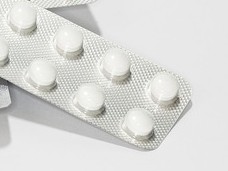Home 2009
Yearly Archives: 2009
Sugary Cola Drinks Linked for First Time to Higher Risk of Gestational Diabetes
Researchers have found for the first time that drinking more than 5 servings of sugar-sweetened cola a week prior to pregnancy appears to significantly elevate the risk of developing diabetes during pregnancy.
Lifestyle Changes, Drug Lower Type 2 Diabetes Risk
Intensive lifestyle changes aimed at modest weight loss reduced the rate of developing type 2 diabetes by 34 percent over 10 years in people at high risk for the disease.
Vegetables Can Protect Unborn Child Against Diabetes
New evidence is emerging for how important it is for pregnant women to eat good, nutritious food. Expecting mothers who eat vegetables every day seem to have children who are less likely to develop type 1 diabetes.
Physician Bias Might Keep Life-Saving Transplants from Black and Hispanic patients
Physician bias might be the reason why African Americans are not receiving kidney/pancreas transplants at the same rate as similar patients in other racial groups.
Does Diabetes Speed Up Memory Loss in Alzheimer’s Disease?
New research suggests that those with both diseases actually have a slower rate of memory loss than people who had only Alzheimer's disease.
Lifestyle Changes May Stave Off Diabetes for a Decade
Sustaining modest weight loss for 10 years, or taking an anti-diabetic drug over that time, can prevent or lower the incidence of type 2 diabetes in people at high risk for developing the disease.
New Class of Molecules May Help Prevent Fatal Complication in Patients with Kidney Disease
Researchers have made an important discovery about why potassium builds up to dangerous levels in the bloodstream.
Mechanism of Insulin Production that can Lead to Better Treatment for Diabetes Discovered
How a specific gene within the pancreas affects secretion of insulin has been discovered. Opens the way for a new understanding of possible paths to battle diabetes and diabetes-related health problems.
Diabetic Episodes Affect Kids’ Memory
Children who have had an episode of diabetic ketoacidosis, a common complication of diabetes, may have persistent memory problems, according to a new study.
Mangosteen Juice Could Protect Health in the Obese
Mangosteen juice has anti-inflammatory properties which could prove to be valuable in preventing the development of heart disease and diabetes in obese patients.
Alzheimer’s Researchers Find High Protein Diet Shrinks Brain
One of the many reasons to pick a low-calorie, low-fat diet rich in vegetables, fruits, and fish is that a host of epidemiological studies have suggested that such a diet may delay the onset or slow the progression of Alzheimer's disease (AD).
International Diabetes Federation Says Epidemic Out of Control
The International Diabetes Federation (IDF) released new data today showing that a staggering 285 million people worldwide have diabetes.
Beneficial Effects of Alcohol: Researchers Urge Caution on Recent Results
According a new study of over 3,000 adults aged 70-79, the apparent association between light-to-moderate alcohol consumption and reduced risk of functional decline over time did not hold up after adjustments were made for characteristics related to lifestyle, in particular physical activity, body weight, education, and income.
Hypertension and Diabetes are Concern in Long-Term Care of Liver Transplant Patients
A recent study by researchers from the University of Colorado looked at post-transplant care to determine whether primary care physicians (PCPs) or hepatologists are better suited to manage the overall health care of patients who received a liver transplant (LT).
Positive Trend for Diabetic Eye Health
Good news on preserving vision in people with type 1 diabetes, a warning from the Cardiovascular Health Study for macular degeneration patients, and a report on how vision impacts well-being across the lifespan.
Chinese Herbal Medicines for Preventing Diabetes in High Risk People
The researchers considered data from 16 clinical trials including 1,391 people who received 15 different herbal formulations. According to their findings, combining herbal medicines with lifestyle changes is twice as effective as lifestyle changes alone at normalising patients' blood sugar levels.





